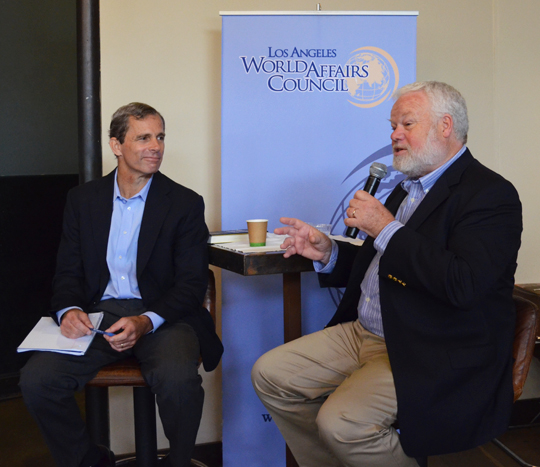
LAWAC President Terry McCarthy with Thomas Ricks (right)
Winston Churchill, “an imperialist and a conservative”, and George Orwell, “an almost monk-like socialist”, shared one burning conviction: the absolute need to preserve individual liberty during an era in the 1930’s when totalitarian systems from the left and the right were sweeping the world. Thomas Ricks, a two-time Pulitzer Prize-winning reporter and author, said that as Hitler and Stalin usurped individual freedoms in their respective populations, “the smart money favored appeasement” – both among many British politicians and pundits, and even amongst some Americans – not the least of whom was Joseph Kennedy, then US ambassador to the UK and father of a future US president.
“Both Churchill and Orwell agreed that freedom has to begin at the atomic level with an individual’s rights – as Orwell said, liberty means the right to say things other people don’t want to hear.” For much of the 1930’s, nobody in Britain wanted to hear Churchill’s warnings about the rise of Hitler, and yet in 1940 Churchill single-handedly saved Europe, said Ricks. “Without his leadership, Nazism surely would have taken over.” And with his two most-read books, Animal Farm and 1984, Orwell wrote the most powerful manifestos of freedom and fundamental critiques of totalitarianism that came out of the era, and still resonate today as totalitarian systems gain strength in Russia and China.
Churchill and Orwell never actually met, although they admired each other from a distance – Churchill read 1984 twice, and the last thing Orwell wrote before he died was a review of Churchill’s war memoirs. But both men understood the need to put facts above ideology, and both men were prepared to criticize their own sides, rather than blindly following the party line. Churchill was a maverick politician, never fully trusted by the Conservatives. Orwell was a left-wing thinker who went to Spain to fight against Franco, but quickly realized that the communists were also guilty of atrocities. Ricks chose to pair the two in his new book Churchill and Orwell: The Fight For Freedom so that he had a truly even-handed approach to the defense of political freedom, a topic that is as relevant today as it was in the 1930’s: “I am really glad the book is not partisan – it is about a socialist and a conservative who both valued freedom, and we can take lessons from both of them.”
Ricks says that like in the pre-WW2 years, many people today seem to prefer power to principle. “This is bad for the country and for its politics especially.” He says the US needs a new generation of politicians to emerge: “I’m looking for people who are willing to change their views when new facts appear.” In the US he says the biggest problem lies within the Democratic Party. “It is not a bad thing for the Republican Party to align with Wall Street, but it is a very bad thing when the Democratic Party isn’t hearing the people it needs to hear – working class people – because of Wall Street.”
Internationally Ricks worries about growing US isolationism. “America no longer seems to understand the role it has played in the world since World War II.” He said Europe “is not naturally a peaceful place – the history of Europe is the history of the German problem, and no one had solved that until America came in to balance German power.” Europe has been peaceful for 68 years – the longest period without war since the French Revolution, Ricks claimed. Now we seem to be dithering on our commitment to maintaining the balance of power in Europe, just as the Russians and the Chinese are challenging US leadership around the world. “Putin and Xi Jinping are symptoms of a bigger problem, America has lost its way and we don’t understand who we are.”
Churchill never forgot what he stood for, even as he stood alone in Britain’s “Darkest Hour” against Hitler’s troops after the fall of France. Orwell similarly never gave up in his literary campaign against totalitarian thought, even as his health declined rapidly while he was still in his 40’s. This was when he wrote Animal Farm and 1984, giving us “the vocabulary of the abuse of state power” with terms like Big Brother, the memory hole and doublespeak. Both men struggled for years to be heard. “Both these people failed a lot more than they succeeded, and that seems to me a very human quality,” said Ricks. “It wasn’t that they were great despite their flaws, it was often because of their flaws,” and because of their willingness to question the conventional wisdom of the day. Would that we had such political leaders and thinkers on the national stage today.
